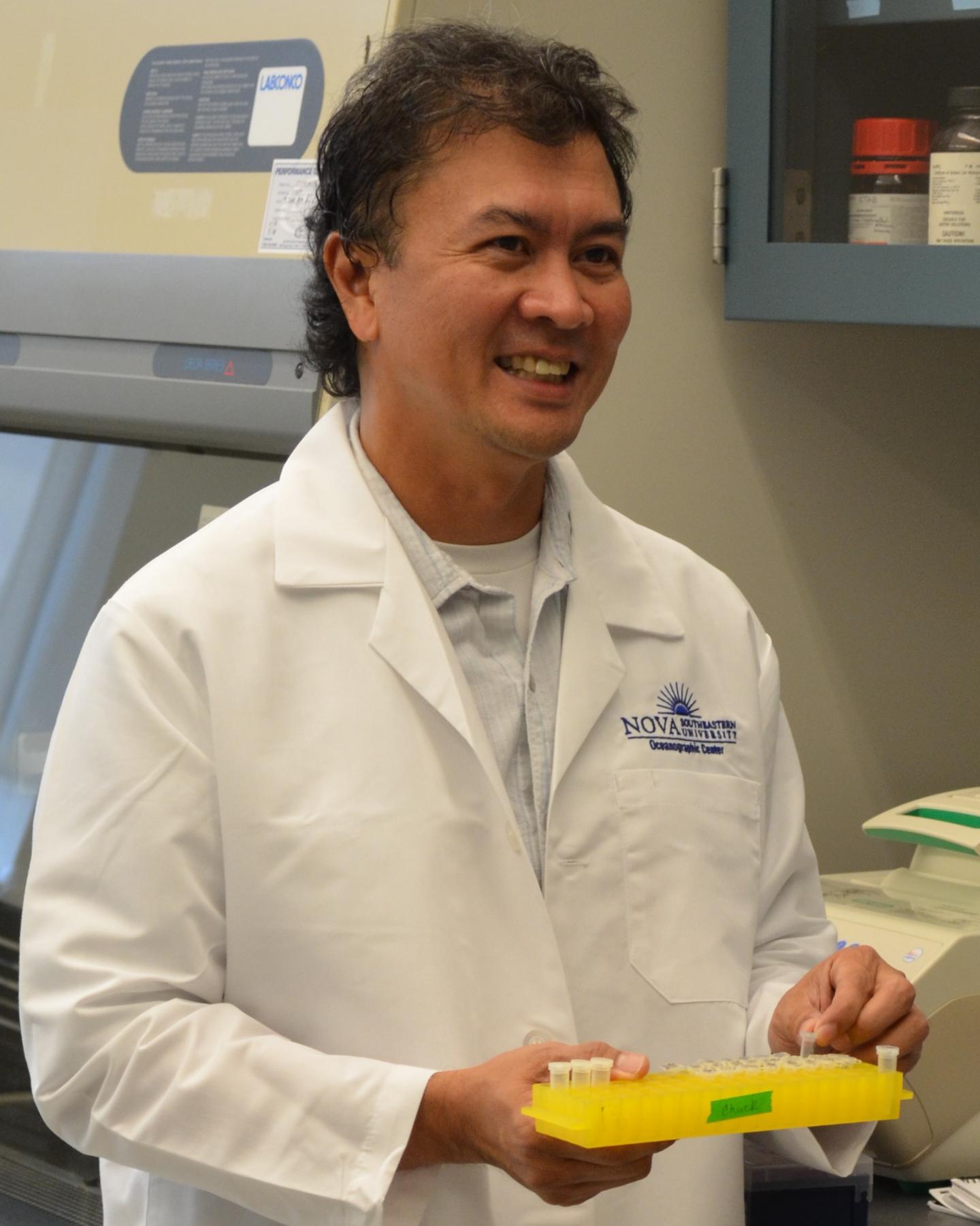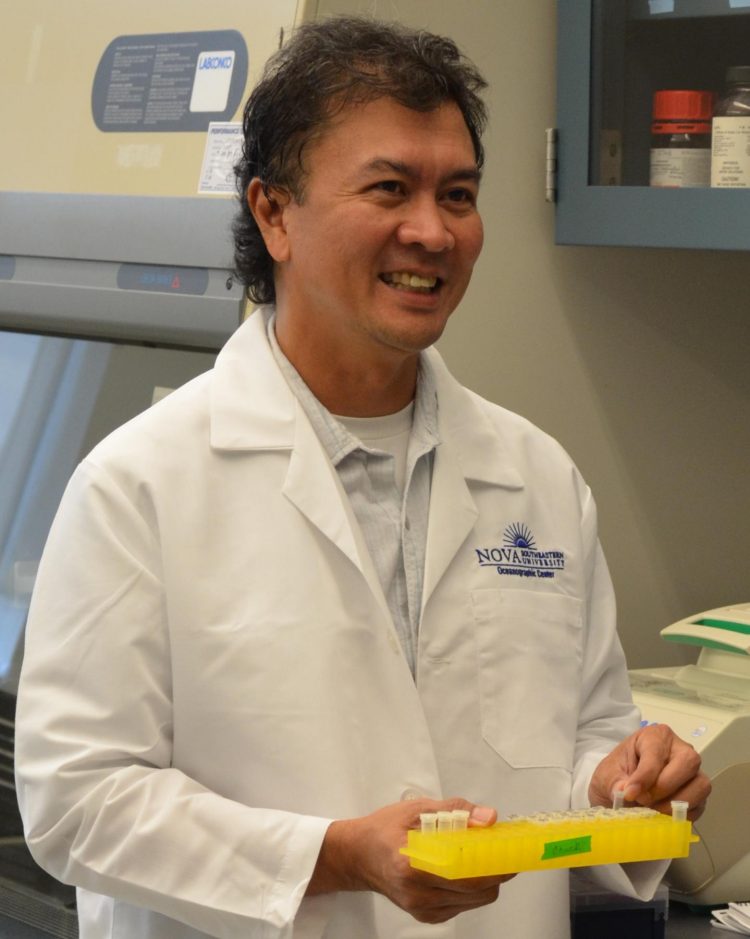Any permanent human space settlement will require beneficial microbes

Credit: Nova Southeastern University
FORT LAUDERDALE/DAVIE, Fla. – With the recent celebration of the 50th anniversary of the Apollo program’s first landing of humans on the moon, the eyes and hopes of the world turn skyward again.
The romantic notions of exploring and even colonizing space have been re-kindled, with the above and more recent movies such as The Martian and the fictional planting of potatoes. The ambitious spirit is further spurred by private space enterprises such as Elon Musk’s SpaceX, Jeff Bezos’ Blue Origins, and the idea that we may need a “Planet B”, as our own planet’s natural habitats become more stressed and the human population exponentially increases.
Jose Lopez, Ph.D., a professor at Nova Southeastern University’s (NSU) Halmos College of Natural Sciences and Oceanography, has now joined the movement with a peer reviewed scientific opinion article calling for a rational and systematic approach to future space colonization of Mars or other planets. He and colleagues Raquel Peixoto and Alexandre Rosado from Federal University of Rio de Janeiro have just published the scientific opinion paper entitled “Space Colonization Beyond Earth with Microbes First” in the journal FEMS Microbiology Ecology –
https:/
Lopez is a research scientist and claims microbes would be a better immediate investment to successfully colonize the red planet.
“Life as we know it cannot exist without beneficial microorganisms,” he said. “They are here on our planet and help define symbiotic associations – the living together of multiple organisms to create a greater whole. To survive on a barren (and as far as all voyages to date tell us) sterile planets, we will have to take beneficial microbes with us. This will take time to prepare, discern and we are not advocating a rush to inoculate, but only after rigorous, systematic research on earth.”
Lopez and colleagues now assert that this rigorous microbial research agenda needs to be implemented for any future successful colonization of Mars. Moreover, microbes should probably supersede current ambitions to send people to Mars or other solar system locales, as they can condition or terraform places we may want to eventually colonize.
In the long run, the effort will save humanity money, can be life-sustaining and boost microbiological understanding
However, to determine the most useful microbes for space requires a lot more research here on earth.
In the publication, the researchers encapsulate this idea into a potential research regime called PIP or “Proactive Inoculation Plan”, which encompasses the screening of potential hardy microbial candidates, toxic or lethal genes, and describing mechanisms for the most productive symbiosis.
“Life on earth started with relatively simple microorganisms which have the capacity to adapt and evolve to extreme conditions, which defined earth’s habitats in the ancient past,” Lopez said. “Cyanobacteria for example provided most of the oxygen we now breath more than two billion years ago. To the find the best microbial candidates, we will have to confer with many microbiologists and carry out research here on our home planet to find the optimal microbial species.”
###
Be sure to sign up for NSU’s RSS feed so you don’t miss any of our news releases, guest editorials and other announcements. Please sign up HERE. You can also follow us on Twitter @NSUNews.
About Nova Southeastern University (NSU): At NSU, students don’t just get an education, they get the competitive edge they need for real careers, real contributions and real life. A dynamic, private research university, NSU is providing high-quality educational and research programs at the undergraduate, graduate, and professional degree levels. Established in 1964, the university includes 16 colleges, the 215,000-square-foot Center for Collaborative Research, a private JK-12 grade school, the Mailman Segal Center (early childhood education) with specialists in Autism, the world-class NSU Art Museum Fort Lauderdale, and the Alvin Sherman Library, Research and Information Technology Center, one of Florida’s largest public libraries. NSU students learn at our campuses in Fort Lauderdale, Fort Myers, Jacksonville, Miami, Miramar, Orlando, Palm Beach, and Tampa, Florida, as well as San Juan, Puerto Rico, and online globally. Classified as having “high research activity” by the Carnegie Foundation for the Advancement of Teaching, NSU is one of only 50 universities nationwide to also be awarded Carnegie’s Community Engagement Classification, and is also the largest private institution in the United States that meets the U.S. Department of Education’s criteria as a Hispanic-serving Institution. Please visit http://www.
About NSU’s Halmos College of Natural Sciences and Oceanography: The college provides high-quality undergraduate (bachelor’s degree) and graduate (master’s and doctoral degrees and certificates) education programs in a broad range of disciplines, including marine sciences, mathematics, biophysics, and chemistry. Researchers carry out innovative basic and applied research programs in coral reef biology, ecology, and geology; fish biology, ecology, and conservation; shark and billfish ecology; fisheries science; deep-sea organismal biology and ecology; invertebrate and vertebrate genomics, genetics, molecular ecology, and evolution; microbiology; biodiversity; observation and modeling of large-scale ocean circulation, coastal dynamics, and ocean atmosphere coupling; benthic habitat mapping; biodiversity; histology; and calcification. The college’s newest building is the state-of-the-art Guy Harvey Oceanographic Center, an 86,000-square-foot structure filled with laboratories; offices; seminar rooms; an auditorium; and indoor and outdoor running sea water facilities. Please visit cnso.nova.edu for more information.
Media Contact
Joe Donzelli
[email protected]
Original Source
https:/
Related Journal Article
http://dx.





